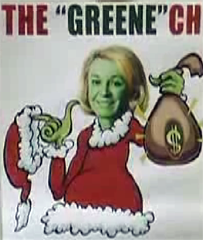
Late last year, Canada Post and the Public Service Alliance of Canada became embroiled in a heated strike action over sick pay benefits. In the midst of the dispute, several PSAC members took direct aim at Canada Post CEO Moya Greene, recording a short parody video titled The Greench. The video, which was posted on YouTube, adapted the well-known Dr. Seuss tune "You're a Mean One, Mr. Grinch" to criticize Greene and the company.
While the creation of a protest video is not particularly noteworthy, what followed soon after is. Just as the video began to attract some attention, YouTube removed it after receiving a complaint from Canada Post alleging that the video violated the company's copyright.
The case highlights a common occurrence under U.S. law, which allows copyright owners to file complaints with web hosts such as YouTube if they believe that the site is hosting infringing content. Under the law, the web host avoids liability if it immediately removes the content. No court or independent third party reviews the infringement claim since nothing more than a complaint that meets certain criteria is needed. The statutory requirements include providing a statement that the complainant has a "good faith belief that use of the material in the manner complained of is not authorized by the copyright owner, its agent or the law."
YouTube may simply have been following the law, but the decision caught The Greench creators by surprise since the song featured original lyrics based on an obvious parody of the Seuss character. Moreover, it was not the Dr. Seuss rights holders who filed the complaint, but rather Canada Post. When asked about the case, a Canada Post spokesperson stated that the claim was based on the inclusion of a picture of the Grinch character with a discoloured headshot of Greene that appears for nine seconds in the video.
Canada Post to face legal backlash?
The strike may have concluded, but the reverberations from the video takedown have not since Canada Post may have opened itself up to possible liability with its claims of copyright infringement. Last year, a California court ruled that Universal Music could face liability for demanding the removal of a home video featuring a two-year-old dancing in their family's kitchen with the song "Let's Go Crazy" by Prince playing in the background. Stephanie Lenz, the mother of the two-year-old in the video, fought back by suing the music company for wrongly filing the takedown demand.
The court concluded that copyright owners should consider whether the use of their work could qualify as "fair use" in order to meet the good faith belief standard. The same claim would seemingly be available to The Greench creators since their brief use of the Greene photo would surely qualify as fair use under U.S. law.
Telus had 23 YouTube videos removed
Should The Greench creators pursue the case, a ruling against Canada Post might serve as a disincentive against the use of takedown notices that appear rooted in attempts to censor rather than enforce copyright. Indeed, the incident is not the first time that a Canadian company has tried to use the U.S. notice-and-takedown system to quell online criticism. In 2007, Telus demanded that YouTube remove 23 videos, including several featuring original union songs. YouTube took down the videos, but a legal challenge to Telus's claim is currently before the courts in California.
As the cases wind their way through the legal system, they provide an important reminder about the dangers associated with the notice-and-takedown rule. Canada has yet to implement such an approach and the experience to date reinforces concerns that legally mandated removal of content from the Internet without court oversight opens the door to abusive practices that may have little to do with protecting the rights of copyright owners.
Related Tyee stories:
- Telus Cleanses Image on YouTube
Take-down of pro-union films angers Internet speech advocates. - Silencing Sports Bloggers
2010 Olympics may test limits of corporate control, free speech. - Funny and Uncensored
The next generation of comedy, YouTube style.
Read more: Rights + Justice, Science + Tech















Tyee Commenting Guidelines
Comments that violate guidelines risk being deleted, and violations may result in a temporary or permanent user ban. Maintain the spirit of good conversation to stay in the discussion.
*Please note The Tyee is not a forum for spreading misinformation about COVID-19, denying its existence or minimizing its risk to public health.
Do:
Do not: